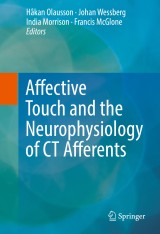Details

Affective Touch and the Neurophysiology of CT Afferents
|
223,63 € |
|
| Verlag: | Springer |
| Format: | |
| Veröffentl.: | 14.10.2016 |
| ISBN/EAN: | 9781493964185 |
| Sprache: | englisch |
Dieses eBook enthält ein Wasserzeichen.
Beschreibungen
CT afferents are receptors in mammalian hairy skin that fire action potentials when the skin is touched lightly which makes them particularly important in affective touch. Traditionally neuroscientific research has focused on more discriminative and haptic properties of touch that are mediated by large myelinated afferents and the coding properties and functional organization of unmyelinated CT afferents have been studied much less. The proposed volume will draw together existing knowledge in this nascent field. Separate sections will address (1) how we can measure affective touch, (2) CT structure and physiology, (3) CT processing, (4) the contribution of CTs to sexual behavior, (5) clinical relevance, (6) commercial relevance, and (7) future research considerations.
Sensual Touch: a slow touch system revealed with microneurography.- Functional Properties of C-Low Threshold Mechanoreceptors (C-LTMRS) in Non-human Mammals.- Cell Biology of Tactile Afferents.- Visualization of the cutaneous axonal endings of CLTMs.- The peripheral processing for pleasant touch in mice.- The touch landscape.- Some historical aspects of cutaneous psychophysics.- Psycophysical assessment of the sensory and affective components of touch.- Processing of C-tactile information in the spinal cord.- Insights from A-beta or C-fiber denervated subjects.- Brain Processing of CT-targeted stimulation.- CT afferent-mediated affective touch: brain networks and functional hypotheses.- Brain processing of reward for touch, temperature, and oral texture.- Social touch.- The neurochemical basis of motivation for affiliative touch.- Affective touch and human grooming behaviours: Feeling good and looking good.- The Midas Effect: How Somatosensory Impressions Shape Affect and Other Concerns.- Intimacy and the brain: lessons from genital and sexual touch.- Affective Touch from a Philosophical Standpoint.- The Effects of Touch.- The Touched Self: Affective Touch and Body Awareness in Health and Disease.- Moderate Pressure Massage Therapy.- Psychiatric conditions and touch.- Pain and Touch: roles for C-tactile afferents in pain inhibition and tactile allodynia.<br> <br> <div><br></div><div><br></div> <div><br></div>
<b>Håkan Olausson</b> is a Consultant in Clinical Neurophysiology at the Linköping University Hospital and Professor in Clinical Neuroscience at the University of Linköping, Sweden. He acquired his PhD at the University of Gothenburg, Sweden and his postdoc training at McGill University, Montreal, Canada. He is the author of more than 70 publications in the field of somatosensation, and he is a member of the board of the Swedish Society for Clinical Neurophysiology and the International Association for the Study of Affective Touch.<br><div><b><br></b></div><div><b>Johan Wessberg</b> is Professor in Neurophysiology at the University of Gothenburg, Sweden. He obtained his PhD in physiology under the supervision of Prof. Ake Vallbo, with a thesis on human hand motor control and proprioception. He then worked as a Research Associate at the lab of Prof. Miguel Nicolelis at Duke University, USA, pioneering work on brain-machine interfaces in monkeys. Currently, his research focuses on the human sense of touch, neural interfaces, and prosthetic touch. He combines single afferent recording using microneurography, psychophysics, and brain imaging using fMRI, EEG and MEG. <br></div><div><b><br></b></div><div><b>India Morrison</b> is a senior lecturer at Linköping University, Sweden. Her research interests include the mechanisms of the central nervous system in relation to pain as well as human affective touch. Her area of expertise is concentrated within human brain processing and functional magnetic resonance imaging (fMRI).</div><div><br></div><div><b>Francis McGlone </b>is Professor in Neuroscience at Liverpool John Moores University and Visiting Professor at the University of Liverpool. He obtained his BSc in Neurobiology and PhD in sensory neuroscience from the University of Sussex, and has maintained a research career in many aspects of somatosensation, working in academia and industry. He has over 120 publications spanning single unit properties of somatosensory afferents recorded with microneurography out to cortical mapping of somatosensory stimulation using ultra-high field fMRI. He is a founder member of the International Association for the Study of Affective Touch. </div>
CT afferents are receptors in mammalian hairy skin that fire action potentials when the skin is touched lightly which makes them particularly important in affective touch. Traditionally neuroscientific research has focused on more discriminative and haptic properties of touch that are mediated by large myelinated afferents and the coding properties and functional organization of unmyelinated CT afferents have been studied much less. The proposed volume will draw together existing knowledge in this nascent field. Separate sections will address (1) how we can measure affective touch, (2) CT structure and physiology, (3) CT processing, (4) the contribution of CTs to sexual behavior, (5) clinical relevance, (6) commercial relevance, and (7) future research considerations.
<p>Summarizes the nascent field of research in CT afferents, a nontraditional field of study in contrast to the widely focused research on touch's more tractable discriminative and haptic properties</p><p>Focuses on the role of CT afferents in relation to coding tactile sensation and affective neuroscience</p><p>One-of-a-kind multidisciplinary overview on the current research of CT afferents, spanning from the micro level (genes) to the macro level (social interactions)</p><p>Includes supplementary material: sn.pub/extras</p>

















